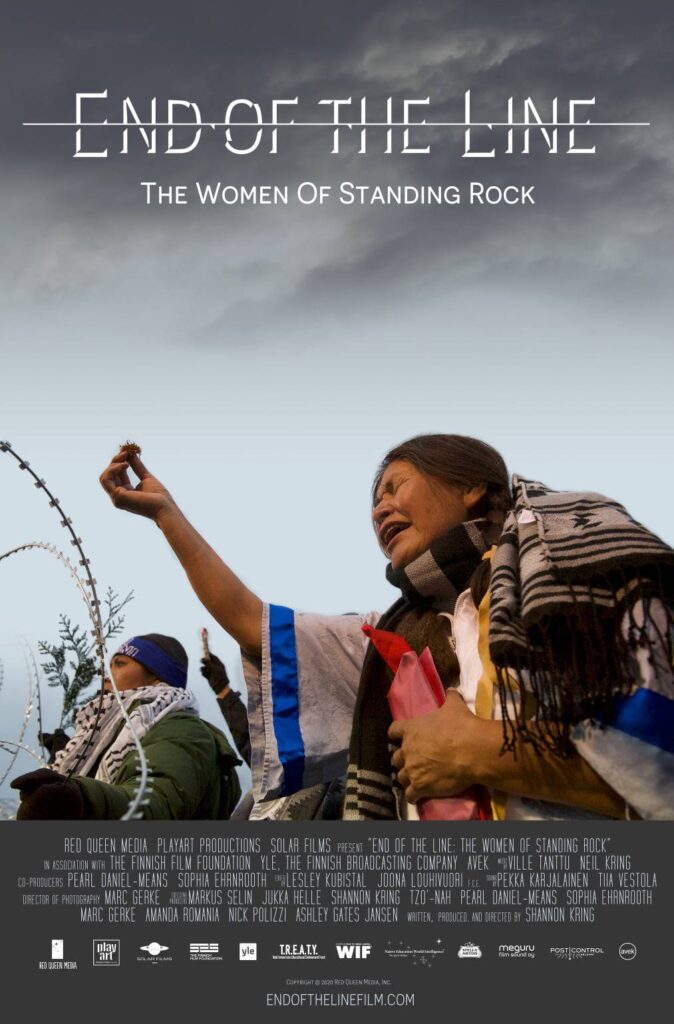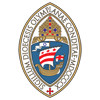
Thanks for joining the Ethnic Ministries/Indigenous Circle of Color, the Climate Justice Task Force, and Meaningful Movies Project at Diocese of Olympia on Nov. 27, 2021 for our online screening of END OF THE LINE: The Women of Standing Rock, by Emmy Award-winning producer and director Shannon Kring. A film that captures history in the making, as a small group of indigenous women establish a peaceful camp in protest of the $3.8 billion oil pipeline construction that threatens their land, water, and existence. When their camp’s population exceeds 10,000, the women unwittingly find themselves the leaders of a global movement.
We welcomed 105 viewers and over 80 folks in discussion. If you missed the event, you can catch up by watching the recording of our panel discussion and community conversation, below.
We offer heart-felt appreciation to our guest speaker, Pearl Daniel-Means. “Every day, we have 10, 12 other nations coming in to stand in solidarity with us. And we’re showing the world who we are, in a nonviolent manner. That’s all we’ve ever wanted, is to be respected, left alone. A nation isn’t defeated until the hearts of the women are on the ground.”
What Next?
END OF THE LINE was created as a cinematic tool to create widespread awareness of and to humanize the struggle and resilience of the American Indian woman in order to change minds, change structures, build community, and transform behaviors. To this end, they are raising funds to create an execute a widespread impact marketing campaign consisting of film screenings, cast and filmmaker talks, a viewer guide, educational tools for schools and museums, and more.
As the women of Standing Rock continue their stand on the front line of the fossil fuel divestment movement, timely exposure for this film is crucial. Marketing independent films without the support of the studios or mainstream media is challenging and expensive. This is where you come in.
1. Contribute whatever you can.
2. Spread the word. Send everyone you know the link to our Indiegogo page.
3. Like us on Facebook.
4. Subscribe to our Vimeo and YouTube channels. Like and share our videos.
Support Women
END OF THE LINE: THE WOMEN OF STANDING ROCK was created as a convening tool to change minds, open hearts, and inspire social and policy change. To join our efforts to create cinematic learning experiences for schools, corporations, and policy makers, donate here.
Support Girls
An expression of resilience and solidarity, ribbon skirt making is a traditional art at risk of being lost. To join our efforts that give Standing Rock Middle School girls instruction and supplies for making their own skirts, donate here.
Host a Screening
As the Women of Standing Rock continue their fight on the front line of the fossil fuel divestment movement, timely exposure for our film is crucial. To host a screening of END OF THE LINE: THE WOMEN OF STANDING ROCK, click here.
Sign Petitions
Our ally organization Lakota People Law Project continues the fight against DAPL. To join the latest actions against this and other pipelines, click here.
Divest
To learn if your bank, city, or university invests in fossil fuel projects, click here.
Support the Standing Rock community’s struggle with the COVID crisis: flexible funds are needed for food, gas, help with children, burials, etc. Featured activist, Phyllis Young is collecting donations here: 8746 Highway 24, Box 69 Fort Yates ND 58538.
Learn more about Shannon Kring and the making of this film.
Standing with Standing Rock taught Episcopalians about solidarity – By Mary Frances Schjonberg

Pearl Daniel-Means
PEARL DANIEL-MEANS, co-producer of End of the Line: The Women of Standing Rock, an activist, and author who speaks around the world on matters concerning indigenous issues, human rights, and environmentalism. She was born into the Ashiihi (Salt) Clan of the Navajo Nation. Her Lakota name, Iyoyanbya Izanzan Win, translates loosely to “Bright Light”. Pearl walked alongside the late American Indian activist, author, artist, and actor Russell Means, as his wife, business manager, and collaborator. She’s been published in Wicazo Sa Review Journal, a peer-reviewed academic journal of Native American Studies, with Almost too Much for the Average Indian; is a Current Board Member at The Romero Institute, an Interfaith Center for Law and Public Policy, and last year, she received an Honorary doctorate of Human Rights and Humanitarian Diplomacy, from Harvest Christian University.
